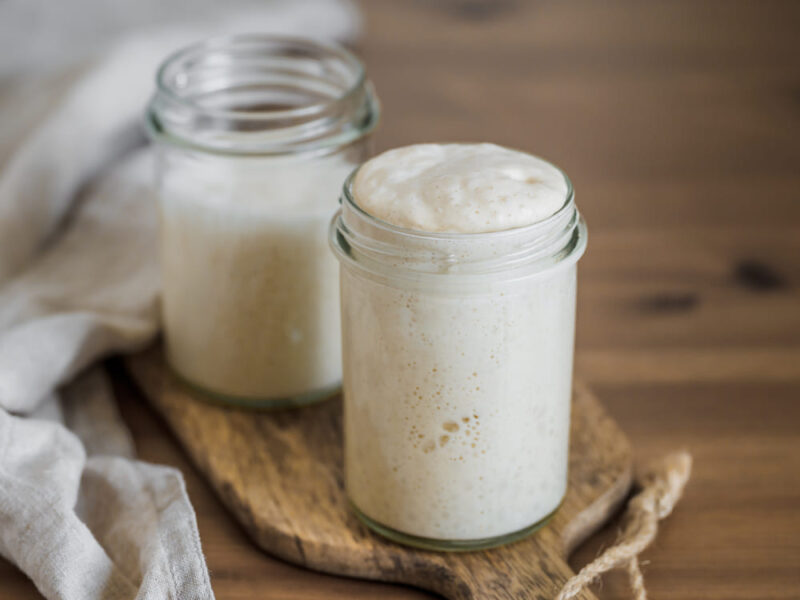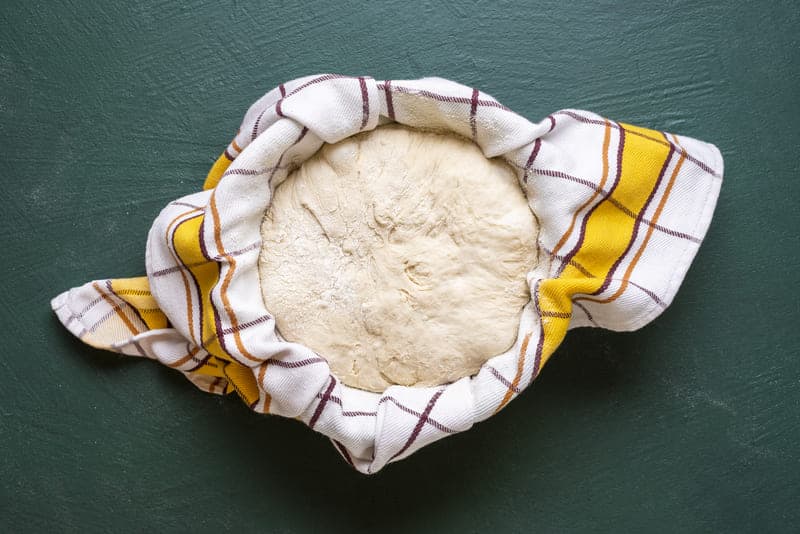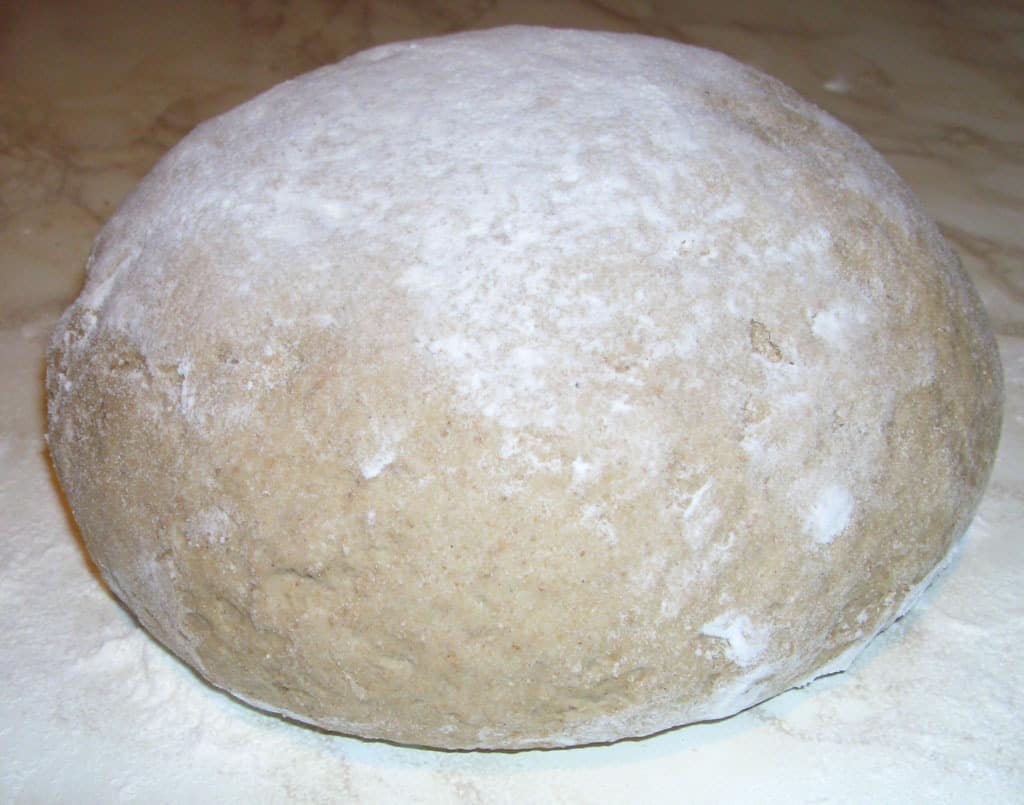Sourdough is essentially a fermented type of dough that you can use in baking bread. You can obtain this type of dough from a previous type of baking and still use it in further recipes.
For your starter to work the way you want it for your next bread recipe, you have to make sure it is rising. If your sourdough starter is not rising, it will be useless for your bread.
The sourdough starters require regular feedings to rise. This type of ingredient is made of active ingredients and it can get up to 14 days to get to the rising level you want for it.
Feeding your sourdough starter means you add water and flour at least once a day. You will find recipes that call for feeding each 12 hours, depending on the flour that is used.
Why is My Sourdough Starter Not Rising?
Your sourdough starter might not be rising for a few reasons.
The good news is that all these reasons are easy to avoid so you can still enjoy tasty bread if you make sure your sourdough is rising.
1. You might not feed it constant enough
Not feeding your dough at least once a day can stop the rising process. The usual quantities you might want to use when it comes to feeding it are 1/2 cup of water and 1 cup of all-purpose flour.
Depending on the rising level you want to get and the quantity of bread you want to make, you could increase these quantities. Make sure you maintain the ratio between them, though.
2. You use too much water
Another possible reason why your sourdough might not rise is if you use too much water. A runny texture will take over the flour in your mix and stop rising.
So, make sure to always use less water than flour. Check the consistency of your dough to make sure it stays at the texture you want so it grows constantly.
3. Give it time!
Finally, a reason for not getting the sourdough level of rising that you want is time.
You will have to give it enough time to rise which could take weeks. Meaning, this type of dough takes patience and you will get better at it the more you make it.
What Do I Do if My Sourdough Starter Doesn’t Rise?
If you determine that your sourdough still doesn’t rise even if you used all the methods above, you will have to take extra measures. Luckily, there are other ways you can fix this situation, and here are some of the best ideas.
For starters, increase the number of feedings. If you have been feeding your dough every 24 hours but you are not happy with the rising progress, try feeding it every 12 hours or even every 8 hours.
Another way to help your dough to rise is to increase the quantity of the feedings. Double the water and flour quantities and see how that affects the rising over a few days.
In most cases, these solutions will enhance the rising process so you can make the most out of your dough and use it in a delicious bread recipe.
Why Has My Sourdough Not Risen?
If your sourdough doesn’t rise as quickly you expect it to, you might need to wait longer. Most of these doughs will take days to rise, so you can’t get disappointed if it doesn’t rise in 1-2 days.
However, you should still notice a level of rising that stays constant. If your dough is rising constantly, it means it develops correctly. You should only be worried if your dough stops rising.
If several days passed and you are not satisfied with the rising level, you can apply one of the methods above. Boost the frequency of the feedings or the quantity you add to the dough for each feeding.
If your sourdough didn’t rise enough, you will not get the same fluffy and tasty bread you want. So, it is important to invest time and be patient when it comes to the rising process.
Can I Add a Little Yeast to My Sourdough Starter?
A great trick to boost the rising process of your sourdough starter is to add a little yeast. You don’t have to add too much, just a pinch of yeast can help the rising process take off easier and with less struggle for you.
However, it is important to keep in mind that adding yeast to your dough, can alter the taste of your bread. Your loaf of bread will not have the sour taste that it has without the yeast.
You can find small envelopes of yeast on the market and use only one envelop at a time so you are not in any danger of using too much yeast.
Even if the yeast can actively help the dough to rise faster and at a steadier pace than a simple mix of water and flour, that doesn’t mean you need it. You can have a perfectly risen sourdough starter without the yeast.
If you are adamant to not alter the taste of your bread, it is even recommended to not add the yeast. Many people love that mild sour flavor in their bread, and they are determined to get that without adding the yeast to their starter.
Sourdough Starter Not Rising 2 Weeks
There are times when no matter what you do and how patient you are, your sourdough is still not rising. In the first 2 weeks, you should notice a certain level of rising in your sourdough starter.
If your starter is not rising in the first week or even after two weeks, you might have made its composition too liquid. As we stated, adding too much water can stop the rising process as your flour will basically be drawn in the water.
Keep the half cup water to one cup flour ratio every time you put together the dough mix. However, what do you do if you already added too much water to it and it didn’t rise because of this? You can simply compensate by adding flour.
In this case, you will have to determine how much flour you add since the water is already too much in the dough. You can do that by kneading it so you can feel its consistency.
The dough should be easy to model and not too runny. Check the consistency of your dough every day until you notice a steady rising rate.
Sourdough Starter Not Floating
If you notice that your starter is not floating, this could be a direct consequence of using the wrong flour. The best flour for a sourdough start is all-purpose flour. If you use the correct ratio between all-purpose flour and water, your dough should float with no issues.
However, if you use any type of flour that is not all-purpose, you will notice that your dough will float slower or even not float at all.
Another cause of a sourdough that is not floating properly might be a lack of hydration so make sure that there is enough water in your dough to hell the floating process.
Conclusion
Making the best sourdough starter can be challenging at first.
However, you will notice that the more time you invest in it and the more you pay attention to your proportions as you mix the ingredients, your chances to create the perfect starter for your bread will increase.
Applying the tips in this guide will definitely help you. However, keep in mind that your personal perception is just as important.
When you are not sure about the texture of your dough, the best thing you can do is feel it with your hands. Apply the information in this guide and put together a delicious bread at home.





4 comments
My starter just doesn’t seem to grow I’m doing everything to measurement I’ve even tried cresting a proofing box and it still won’t grow in the beginning I did a 1.1.1 then I increased it could that have been the problem I have the right mixture it’s not runny I just don’t know what else to do
Mine too
Hello, thank you for reaching out! The only issue I can see is if you didn’t use the right flour. All-purpose flour is one of the best to use for such a recipe. You might also want to feed it more often next time and reduce the water quantity by 10% to begin with. Hope this helps! Good luck!
They tell me to soak finely cut organic apple peels (straight from the tree) in cold water for an hour in a bit of water and mix that water with flour to initiate a sourdough starter. After that it’s normal feedings.